Show 252: Listening Guide
From the Top’s broadcast for Show 252 was taped at the Tivoli Theatre in Chattanooga, TN on Thursday, April 26, 2012. We asked our performers to tell us about the music they performed on the show:
Jerry Feng, piano, 17
Etude Op.10, No.12 in C minor, “Revolutionary”
By: Frederic Chopin
I just really think this is a great piece. I first began learning it four years ago and I seem to always bring it back 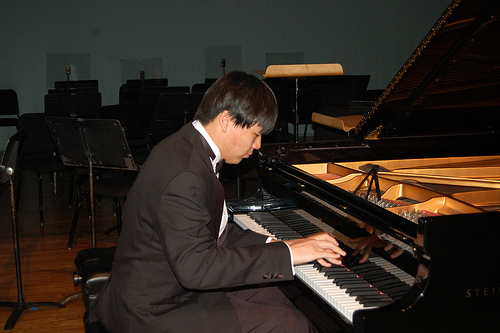 from the dead for various performances. Personally, playing the etude evokes memories of my own “hardships.” I know my “problems” are not nearly as serious as the Russian occupation of Poland, but I think it was Chopin’s goal to elicit this kind of bitter and desperate feeling.
from the dead for various performances. Personally, playing the etude evokes memories of my own “hardships.” I know my “problems” are not nearly as serious as the Russian occupation of Poland, but I think it was Chopin’s goal to elicit this kind of bitter and desperate feeling.
I feel like the most unique aspect about this piece is the incredible amount of raw emotion placed into the short 2 1/2 minutes. That being said, I believe the most inspirational (and hardest) part to accomplish is really making the audience feel and understand Chopin’s outrage and sadness.
Post Show Reflection: My favorite memory was hanging in the dressing room before the performance. Performing on that stage was absolutely breathtaking, fantastically amazing, and unforgettable. But I really wish I got to spend more time with the other incredibly talented musicians there.
Music will bring people together.
John Burton, trumpet, 17
Fantasie in E-flat
By: Joseph Edouard Barat
This is such an interesting piece. It has an ominous fanfare that kicks off the piece and recurs throughout. Then it goes into a very lyrical melody that is voiced in different styles. For me, I don’t have a particular story in mind when I play this piece, but I do have certain moods I try to recreate as themes to come and go. It has dramatic, fluid, playful, and even jazz-influenced sections. The whole piece is very French. Overall, it is really neat to listen to!
a particular story in mind when I play this piece, but I do have certain moods I try to recreate as themes to come and go. It has dramatic, fluid, playful, and even jazz-influenced sections. The whole piece is very French. Overall, it is really neat to listen to!
This piece has a lot of character and it is really important to portray that. I am not worried about any technical sections, but being a brass player can easily prove otherwise! You never know how your chops will feel on a certain day! You could feel great one day and terrible the next. That is also another motivation to practice – nothing is ever perfect.
Post Show Reflection: It was fun hanging out with everyone in one of the dressing rooms before and during the show, and to play on the stage and see how “From the Top” does everything.
Music can bring happiness.
The Camerton String Quartet
II. Allegro furioso from the String Quartet No. 10, Op.118
By: Dmitri Shostakovich
Rebekah Heckler, violin, 16
This piece is incredibly exciting. Every time we play it, I get a huge adrenaline rush. The piece is very powerful and 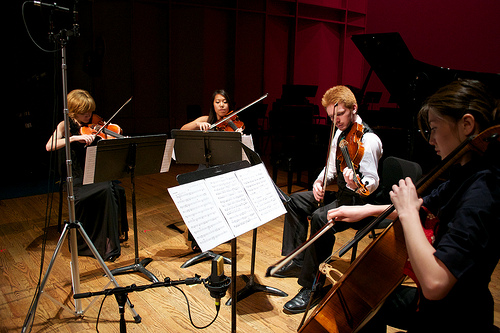 builds suspense with reoccurring patterns. While a longer melody is being played, there are eight notes and sixteenth notes being played by other members of the quartet. It keeps things very suspenseful and on-edge throughout the piece. It’s a very dark piece, which sounds a lot like war.
builds suspense with reoccurring patterns. While a longer melody is being played, there are eight notes and sixteenth notes being played by other members of the quartet. It keeps things very suspenseful and on-edge throughout the piece. It’s a very dark piece, which sounds a lot like war.
With every new piece comes a new challenge. The most exciting aspect of the Shostakovich is the character we try to convey. There are many little details ranging from how we play an accent to the overall balance. With the Shostakovich, it is very hard to not to let my adrenaline get going too much to where I rush fast passages. There are some very difficult octaves toward the end of the piece – it’s an incredibly fun challenge.
Post Show Reflection: There are so many fantastic memories. I loved hanging out with the other performers backstage, getting interviewed on a radio show for the first time, and the rush of performing with my quartet onstage for such an awesome live audience. It was so exciting to perform onstage! The audience was so energetic. I felt that my performance was hugely inspired by all the energy in the hall.
Music changes lives. It gives people an outlet to explore and convey their emotions. Music has the power to inspire, connect, and transform lives.
Julia (Geeo) Son, violin, 15
This music is a very energetic, hard piece to play. When I start this piece, I put myself to be more energetic and powerful. My favorite part is when we play the 10 to 20 measures of the ending. The ending builds an immense power and takes a lot of energy to express the sound to the audiences. My least favorite part is of course the high notes that are very hard to play (shifting to high position). When I play this piece. I think about anger; a climax of a story. Before we played this piece at MYA, I got so nervous and was trembling the whole time!
This piece is special for me because I have never played a chamber music piece by Shostakovich. I love the music’s energy and expression compared to other pieces. I think the most important thing is matching our sounds with each other instead of playing the piece as loud as we can. It is really hard to maintain the energy playing loud and listen to each other all at the same time. This piece is one of my favorites because I personally love music with a lot of energy and anger (expression).
Post Show Reflection: My favorite memories were performing on a stage for hundreds, meeting new people that share the same passion towards music, and meeting the staff and recording our performances. I was nervous but very excited on that stage. It was a great experience to perform in such a beautiful hall and share our music with the audience. It is a memory I will never forget.
Music has the power to do anything. It makes you a better person, and allows you to be yourself. It also helps people to gain leadership qualities like encouraging others and persevering on your goals towards things that don’t have to involve music.
Sean Byrne, viola, 17
This piece has a violent energy through and through. It’s easy enough to get that concept, but how can this be 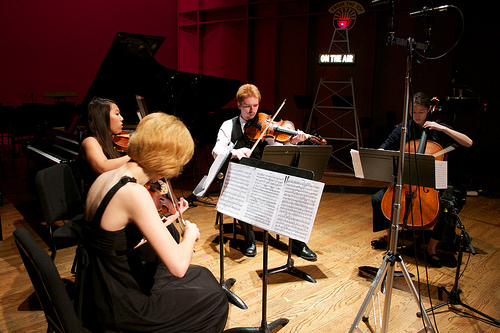 conveyed? Our task as an ensemble has been to experiment with how we can convey these ideas in our heads through the instruments in our hands.
conveyed? Our task as an ensemble has been to experiment with how we can convey these ideas in our heads through the instruments in our hands.
Energy must be continually spent to perform this piece. It’s hard to keep pushing forward sometimes, but to drag or hold back in excess would ruin the continuity of the piece. Also important to the energy is our volume, which we must balance with tone quality (another issue which has required experimentation).
Post Show Reflection: My favorite memory was being in the dressing room before the performance. The energy and anxiety of waiting was all fun! After months of work went into preparation for this performance, watching it come to fruition was so fulfilling.
Music can express, influence, entertain, and inspire.
Nomin Zolzaya, cello, 18
The piece itself is very powerful, heavy, and pressured. Sometimes it’s very hard to focus on and be in the right character because usually we laugh a lot when we start this piece. One of the hardest things is that keeping the tempo steady and holding the energy in a bubble.
Post Show Reflection: I had a lot of fun during the three days, because everybody was so funny, and charming (especially the pizza party!) That was one of the best performances we’ve ever played. We felt the most warmth and a really powerful energy from the audience.
Music is the only language that doesn’t need to be translated to others in the world.
Thomas West, bass-baritone, 16
“Grosser Herr” from Christmas Oratorio, BWV 248
By: J.S. Bach
I love this aria by Bach because of its message. I feel that as a musician, it is my job to translate the text for my audience in the style that the composer would have wanted. It was extremely important for me to do it for this 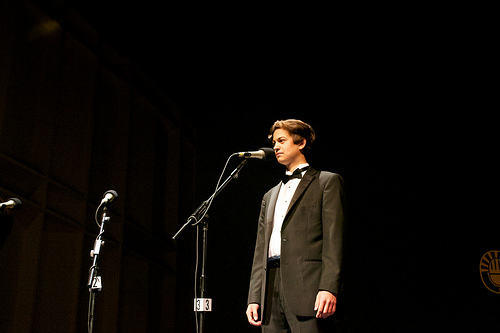 particular piece of music because of it being in German. However, the style of Bach has no language boundaries and one really hears that in this piece. It begins with words that translate as: “Great Lord, O Mighty King, Dearest Savior, O how little you regard earthly splendor.” Right off the bat, Bach translates this text for his audience through the opening accompaniment. The piano sounds like a multitude of trumpets coming together to recognize the awesomeness of God. Then, the Bass solo enters and once again, Bach paints a picture of God’s power through song.
particular piece of music because of it being in German. However, the style of Bach has no language boundaries and one really hears that in this piece. It begins with words that translate as: “Great Lord, O Mighty King, Dearest Savior, O how little you regard earthly splendor.” Right off the bat, Bach translates this text for his audience through the opening accompaniment. The piano sounds like a multitude of trumpets coming together to recognize the awesomeness of God. Then, the Bass solo enters and once again, Bach paints a picture of God’s power through song.
The B section of the piece is entirely different. In English the text reads: “He who maintains the whole world and created its glory and adornment must sleep in a hard crib.” Bach translates this by creating a mysterious kind of feel in the melodic line. It is softer and gentler, but also has a sense of question about it. I believe Bach wanted his audience to ponder why the God of all creation would humble himself to such a lowly position on earth.
Bach then finishes the piece by repeating the A section, reminding the audience once again of the majesty of God. My job then becomes to show both that power and mystery to my audience. When I sing this piece, I’m thinking about the awesomeness and might of God and what a blessing God has been in my life.
Post Show Reflection: I loved being able to perform in front of my friends and family, and seeing all of them afterwards. Taking the final bow with all of the performers in my hometown was special. At first, stepping on stage was a bit nerve-wracking, but after I started singing everything changed. My thoughts became focused on presenting my piece for the glory of God and giving it the energy and excellence it deserved. All of those countless hours of practice culminated in one very special moment. After I finished, getting such a warm reception was truly appreciated.
Music can change lives. It is an art form that teaches the importance of beauty. Every piece of music has a message to give, and I think presenting that message through music is the best way to teach another person about something that you as a musician hold dear.
Alina Kobialka, violin, 15
Carmen Fantasie
By: Franz Waxman
I think about the tragic tale between Carmen and Don Jose (I really recommend the opera Carmen if you haven’t seen it!), and how much sadness and anguish there is. My favorite part would have to be the last few sections,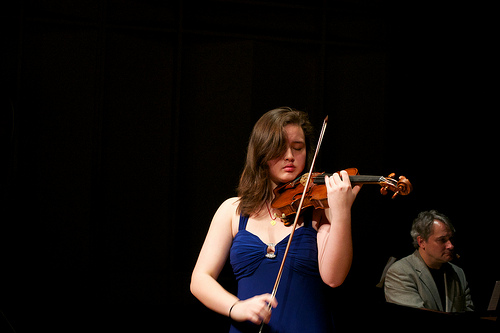 where the excitement and momentum build up until the last two bars and it finally finishes. The piece always reminds me of a flaming red (or a flame), because I find the piece to be extremely fiery and emotional.
where the excitement and momentum build up until the last two bars and it finally finishes. The piece always reminds me of a flaming red (or a flame), because I find the piece to be extremely fiery and emotional.
This piece probably has the most variations on a theme out of everything I have played. Waxman makes so many variations out of one of two themes (it’s pretty awesome!). This piece is technically challenging but not impossible, and it is so fun to play!
Post Show Reflection: My favorite memory was backstage with all the performers – we were all joking around and getting to know each other. By the end, it was like we had known each other for a long time, not just for two days. The performance was so exciting! I have never done anything like that before, and it was so different from a live performance. It was so much fun and if I get a chance to do it again I totally would!
Music has the power to touch people’s hearts, and allows a person express oneself. It can bring people together, and can be a language all by itself.



